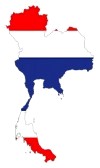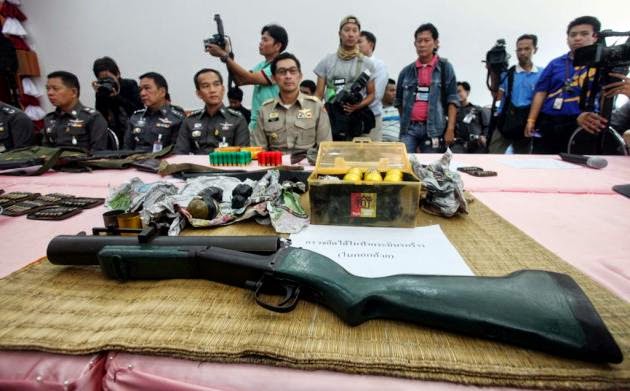Thailand: Collapsing Regime Turns to Terrorism

In the early hours of Thursday morning, M79 grenades and small arms fire were directed at anti-regime protesters camped out at Bangkok’s Democracy Monument.
The attack resulted in 3 deaths and over 20 injured – some of them critically.
It was the latest in a string of terrorist attacks carried out by regime militants, openly organized and used by the regime to menace its growing list of political opponents.
–
—
Confirming the regime’s intent to deploy heavily armed terroristsin a bid to cling to power, TIME magazine on January 16 reported in their article, “”Bangkok Shutdown: Yingluck Supporters Prepare to Fight for Democracy,” that (emphasis added):
As Thailand’s anti-government protests enter their fourth day, observers say prospects for violent confrontation are increasing, with reports of government supporters stockpiling weapons in case of Prime Minister Yingluck Shinawatra’s ouster.
According to the Bangkok Post, radical members of the Red Shirts — diehard champions of Yingluck and her notorious brother Thaksin Shinawatra — are readying a cache of arms in case the 46-year-old premier is forced from office by either military or judicial intervention.
The paper quoted a Red Shirt source as saying “There are strong anti-coup and anti-court sentiments among the red-shirt mavericks who are familiar and experienced with weapon use.”
Ten men have been arrested for firing M-79 grenades into the National Anti-Corruption Commission (NACC) office in Nonthaburi, while many war weapons were found hidden in an abandoned area near the agency’s office.
Police searched areas around the NACC after two M-79 grenades landed in its compound at around 10.45pm last night.
The grenade damaged the window of a women’s restroom on the 4th floor of the building, while an exterior wall was damaged by another grenade. Many grenade fragments found scattered around the area.
During the search operation, police found three men who behaved suspiciously, walking from a wooded area, an abandoned area in Nonthaburi Soi 46. Police also found a AK-47 assault rifle and ammunition.
After that police detained seven more suspects who joined rally of the Radio Media for Democracy Group, the pro-government group protesting against the NACC, blocking the entrance of the agency’s ofices.
The article would also state:
Another group of police searched the bush near the stage of the Radio Media for Democracy Group and found hand grenades, a gun, bullets and an M-79 grenade launcher.
A follow-up article would reveal that the hand grenades were RGD-5s – not only the same type used in other attacks against anti-regime protesters that have thus far left 24 dead, including men, women, and children, and hundreds more maimed, but were of the same lot number as well.
–
Further incrimination of the regime’s own militant front came when members of its “red shirts” demanded the release of suspects tied to the weapons cache as reported by Thai PBS’ article, “Red shirts demand police to release their colleagues arrested with firearms.” The Thai PBS article stated:
Red-shirt followers laid siege to Nonthaburi police station today (Friday) to demand police to release a group of suspects, including red-shirt guards, earlier arrested with a cache of war weapons in Chaeng Wattana area.
The suspects were arrested with several weapons, including one AK47 assault rifle, one M79 grenade launcher, several M79 grenades and hand grenades, one shotgun, a knife and several ammunition.
There is no doubt that the regime has organized, armed, and deployed militants against growing unrest in the streets of Bangkok and indeed, in provinces around the country. A particularly brutal attack had been carried out against a rally in Trat province, several hours from Bangkok near the Cambodian border. One child was killed and scores more wounded when regime gunmen threw grenades and opened fire on more than 2,000 protesters.
–
A pro-regime “red shirt” rally held the same day in Nakhon Ratchasima province would celebrate the attacks with one “red shirt” leader claiming, according to Bangkok Post’s article, “Sickening, disgusting celebration of violence,” that:
“I have good news to tell my red-shirt brothers and sisters from all provinces. The People’s Democratic Reform Committee members of Suthep (Thaugsuban) at the protest stage in Khao Saming (Trat province) were deservedly given a reception by the locals. Five PDRC people were killed and over 30 injured. The locals welcomed them because they love Suthep a lot…,”
While the Western media continues to portray the current political crisis in Thailand as one between “Bangkok’s royalist elite” and the “rural poor” the protests now represent both Bangkok’s business and middle class, as well as rural poor from across the country, including rice farmers that had once formed the foundation of the current regime’s political support. This is owed to a disastrous rice subsidy program implemented by the regime in 2011, that has since gone bankrupt and plunged Thailand’s once world renowned agricultural industry into crisis, leaving farmers unpaid, in debt, and increasingly desperate and angry.
- In the late 1990’s, Thaksin Shinawatra was an adviser to notorious private equity firm, the Carlyle Group. He pledged to his foreign contacts that upon taking office, he would still serve as a “matchmaker” between the US equity fund and Thai businesses. It would represent the first of many compromising conflicts of interest that would undermine Thailand’s sovereign under his rule.
- In 2001 Shinawatra privatized Thailand’s resources and infrastructure including the nation’s oil conglomerate PTT while raising the amount of shares foreigners could hold. This led to big-oil giants such as Chevron and Hess siphoning out billions in revenue from Thailand’s natural gas and oil supplies.
- In 2003, Shinawatra would commit Thai troops to the US invasion of Iraq, despite widespread protests from both the Thai military and the public. Thaksin would also allow the CIA to use Thailand for its abhorrent rendition program.
- Also in 2004, Shinawatra attempted to ramrod through a US-Thailand Free-Trade Agreement (FTA) without parliamentary approval, backed by the US-ASEAN Business Council who just before the 2011 elections that saw Thaksin Shinawatra’s sister Yingluck Shinawatra brought into power, hosted the leaders of Shinawatra’s “red shirt” “United Front for Democracy against Dictatorship” (UDD) in Washington DC.
- Since the 2006 coup that toppled his regime, Shinawatra has been represented by US corporate-financier elite via their lobbying firms including, Kenneth Adelman of the Edelman PR firm (Freedom House, International Crisis Group,PNAC), James Baker of Baker Botts (CFR, Carlyle Group), Robert Blackwill (CFR) of Barbour Griffith & Rogers (BGR), Kobre & Kim, Bell Pottinger (and here) and currently Robert Amsterdam of Amsterdam & Partners (Chatham House).




